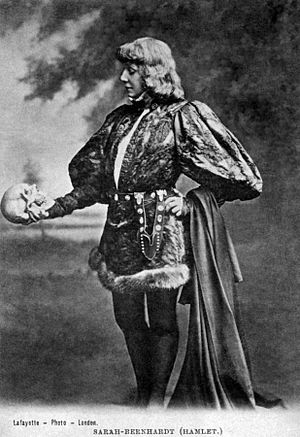Travesti facts for kids
Imagine watching a play, an opera, or a ballet, and seeing an actor play a character who is a different gender than themselves! In theatre, this is called travesti. It's a special way performers can take on roles that are usually meant for someone of the opposite gender. The word "travesti" comes from a word that means "disguised."
Sometimes, a woman plays a male character, especially a young man or boy. This is known as a breeches role. Other times, a man might play a female character. This has been a part of theatre for a very long time, adding unique twists to stories and performances.
Travesti in Opera
Opera often features travesti roles, especially for young male characters. These roles are usually sung by women, often sopranos or mezzo-sopranos, because their voices can sound like a young boy's voice. This also allows for different vocal sounds and harmonies in the music.
Here are some famous examples:
- Cherubino in The Marriage of Figaro: This character is a young, playful boy who is often played by a woman.
- Siebel in Faust: Siebel is another young male character, a friend of the main character, and is typically performed by a woman.
- Octavian in Der Rosenkavalier: Octavian is a young nobleman, and his role is famously sung by a woman.
Travesti in Ballet
Ballet also uses travesti roles to bring characters to life. Sometimes, these roles are traditional, meaning they have been performed this way for many years.
- Frantz in Coppélia: In the ballet Coppélia, the role of Frantz, a young man, was traditionally performed by a woman at the Paris Opera until the 1950s.
- Carabosse in The Sleeping Beauty: Carabosse is a wicked fairy. This role is often performed by a man dressed in women's clothing, which can make the character seem even more powerful or scary.
- Stepsisters in Cinderella: The funny and often clumsy Stepsisters in the ballet Cinderella are sometimes played by men in women's clothing. This can add a lot of humor to the performance.
Travesti in Musicals
Modern musicals also use travesti roles, sometimes for comedic effect or to highlight a character's personality.
 | William L. Dawson |
 | W. E. B. Du Bois |
 | Harry Belafonte |


